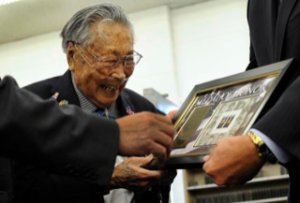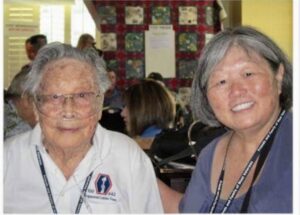June 1, 2021
I want to thank everyone who worked tirelessly to create the Go For Broke stamp as well as those who worked to get the Go For Broke Stamp issued. I know my father, in heaven, is especially proud and happy for this to be happening. I can visualize the joy on his face.
The attached photo, which is one of my all-time favorites, was taken at the Stockyards Branch of the Post Office at a gathering celebrating the issuance of the Medal of Honor WWII stamps. I believe a reporter from the Denver Post took this photo. Can you imagine the size of his smile if he were holding both the Medal of Honor and the Go For Broke stamps?

My father’s story is not unlike many young Japanese Americans at that time. When his family heard that Japan bombed Pearl Harbor, his reaction was shock, disbelief and a need to join Military Service to defend the country he loves, and then followed by Executive Order 9066 deeming him an enemy alien. He was devastated. “Why? I am an American!”
He had extended family in Phoenix who agreed to take them in which made it possible to avoid being sent to an internment camp. So, when he was allowed to enlist, he had added incentive to prove that the Japanese Americans were loyal Americans, who loved their country as much or more than other young American men.
My father always said he enlisted in the Air Force. To his surprise, when they got off the bus for basic training, he asked his DI “Where are the Airplanes?” to which the DI replied “Son, you are in the Army now.” They, needless to say, were in the segregated unit RCT442.
My dad was not a natural soldier. He said he couldn’t shoot well, and the rigor of going up and down the mountains in France was so hard that his buddies had to carry his pack for him. He was required to carry his own gun, just in case it was needed. (In his 70’s he learned from his cardiologist that he had a heart murmur which most likely was part of the problem for him back then.)
On Hill 617 when his best friend, Saburo Tanamachi, died in his arms, he started a one man charge up the hill with his Thompson submachine gun. When the Thompson ran out of ammunition, he continued his charge with a German rifle and pistol. He killed seven German soldiers and he and his platoon (who followed his lead up the hill) captured 34.
As his platoon was on en route to rescue the Lost Battalion he was wounded by a mortar shell which exploded behind him. His heavy winter coat tightly folded in his backpack slowed down the shell, which ended up becoming embedded so close to his heart that the doctors felt it was safer to leave it in his chest. Dad spent more time in the hospitals than his actual service time on the battle fields. He was awarded the Distinguished Service Cross on the day of his discharge from the Army.
Once my dad got back from the war, he and his brother, Henry, decided to take a trip across the country before settling down. Henry knew a young man in his unit that lived in Denver. During that Denver stop, my father met Bess Saito who he later married.
Dad talked about how difficult it was to find a job post-war. The anger toward the Japanese was the main problem. He would often wear his uniform to job interview as a way to show his allegiance to our country. He took classes at the University of Denver during the day and worked at the post office at night. He found the Post Office a good place for him. He found another family working at the USPS.
In 2000 my dad’s DSC was upgraded to the Medal of Honor. When the General called to tell him of the upgrade to the MOH my father was speechless. The general wondered if dad had passed out because it took so long for him to respond. This honor allowed my parents to travel across our Nation to MOH events and meet wonderful people.
I think a benefit that few would realize is it gave my father a forum to tell the story of the 442nd. Most vets were amazed at his memory and willingness to share his stories. I loved going with him and watching the students faces as he would talk.
He would always end his talk saying “People say that I am a hero, but I am not. The real heroes are the ones who were not able to come home.” He was proud to be a part of the 442nd, and proud to keep their memory alive.
Remember the ceremony for the Medal of Honor Stamp? When the post office learned that dad was a WWII MOH recipient and a retired postal employee he was invited to the WWII Memorial for the unveiling. That was very special. We even met the Postmaster General.
The most recent blessing is that the Stockyards Station post office was renamed the “George Sakato Post Office” in 2019. It is not a fancy station, but it is the office from which he retired.
I am very grateful to the Postal Service for honoring the Nisei Veterans and for taking such good care of one of their employees.

